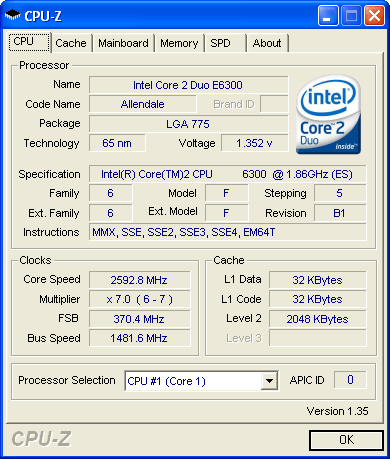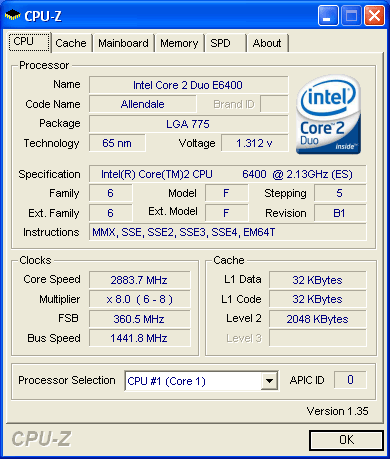Intel Core 2 Duo E6300 & E6400: Tremendous Value Through Overclocking
by Anand Lal Shimpi on July 26, 2006 8:17 AM EST- Posted in
- CPUs
Overclocking
Overclocking lower end CPUs is always more fun if you're actually buying these things because, as long as the manufacturing process is mature and your component selection is sound, you're usually able to reach much higher speeds than you paid for - an ever rewarding achievement. The Athlon 64 X2 CPUs have been fairly good overclockers, with the X2 3800+ usually able to run anywhere from 4600+ speeds (2.4GHz) up to FX-62 speeds (2.8GHz) and sometimes slightly beyond (3.0 - 3.1GHz). While we don't have any Socket-AM2 Athlon 64 X2 3800+ CPUs on hand (we will use a 4600+ and underclock it for our benchmarks), we do have performance results of the X2 4200+, 4600+ and FX-62 to give you an idea of where an overclocked X2 3800+ can get you performance-wise.
What we didn't know previously however was how far we could overclock retail E6300/E6400 CPUs, and furthermore we had no idea what a highly overclocked 2MB Core 2 Duo CPU would perform like. Armed with two B1 stepping Core 2 Duo CPUs, one E6300 and one E6400, we went to task on overclocking them. Our goal wasn't to reach the absolute highest overclocks using high end cooling, but rather the maximum stable overclocks easily attainable with a stock Intel heatsink/fan. Undoubtedly we could have reached higher frequencies with more elaborate cooling, but we were more interested in the bare minimum of what was attainable - and we weren't disappointed.
Our E6300 was able to reach 2.592GHz using a 370MHz FSB at 1.400V (up from 1.320V stock):

Our E6400 was a bit more successful, reaching 2.88GHz using a 360MHz FSB at 1.350V (up from 1.300V stock):

Both CPUs were totally stable when overclocked and were able to complete our multiple days of benchmarking without behaving any less stable than when clocked at their default frequencies.










137 Comments
View All Comments
getbush - Wednesday, July 26, 2006 - link
There is a for that should be four and you start the oblivion page with will instead of we'll.JarredWalton - Wednesday, July 26, 2006 - link
Thanks - I gave the document a final proofing now that I'm a bit more coherent and squashed several more "typos" (speech-recognition-os?) I helped Anand fill in a bunch of the text, but it was late and my eyes weren't cooperating. LOLyacoub - Wednesday, July 26, 2006 - link
What I see here is that the E6400 is easily the way to go for folks who aren't interested in overclocking but want the best bang-for-the-buck.For very little more $$ than the E6300, you get a chip that rides quite a bit higher up on the charts in many tests.
Now the question: What affordable motherboard is recommended for stable, reliable non-overclocked C2D Conroe performance? Perhaps the Intel P965 board?
There's no reason to drop $200-250 for a motherboard when you aren't going to utilize its overclocking functionality. I believe that opens up the user to the more affordable P965 boards, right? They tend to be more around $150 and if it's made by Intel it should be plenty stable, right?
Also most boards now are passively-cooled which is excellent since the dinky fans on older motherboards were always noisy and died quickly. Avoiding those is another benefit as I believe the Intel P965 board is passively cooled as well.
Thoughts?
anandtechrocks - Wednesday, July 26, 2006 - link
Check out the Gigabyte DS3. It uses the P965 chipset and costs ~$144. It overclocks just as well as the $250 Asus motherboard in this article and it uses very high quality solid capacitors. Only drawback is that no SLI or Crossfire.yacoub - Wednesday, July 26, 2006 - link
I don't know, looks like there's some cause for concern about currently available 965 boards now...http://forums.anandtech.com/messageview.aspx?catid...">http://forums.anandtech.com/messageview...amp;thre...
anandtechrocks - Wednesday, July 26, 2006 - link
Very good article, I really enjoyed it. I think there is an error on page 4, on the 3rd graph from the bottom. The E6300 and E6400 bars are miss-labled.JarredWalton - Wednesday, July 26, 2006 - link
Fixed - thanks.code65536 - Wednesday, July 26, 2006 - link
How do the OC'ed chips do with power consumption. Does a 6400 @ 2.88 use more or less power than a 6800, for example?supremelaw - Wednesday, July 26, 2006 - link
... and heat.I assume that the stock Intel HSF hasn't changed:
http://www.supremelaw.org/systems/heatsinks/warnin...">http://www.supremelaw.org/systems/heatsinks/warnin...
and that a superior HSF with proper backing plate
is still recommended for Conroe CPUs, even though
they run cooler in general.
Sincerely yours,
/s/ Paul Andrew Mitchell
Webmaster, Supreme Law Library
http://www.supremelaw.org/">http://www.supremelaw.org/
houe - Wednesday, July 26, 2006 - link
fp